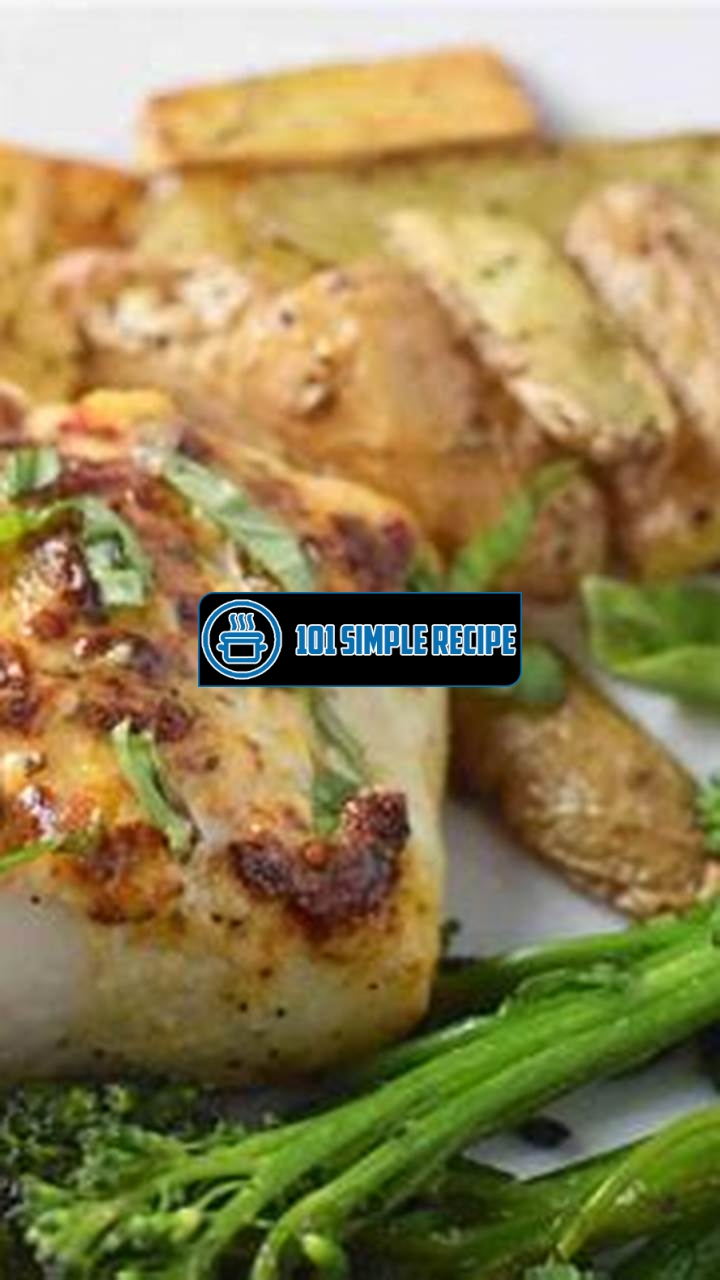Are you ready to indulge in a delicious and healthy dish? Look no further than the perfect Mediterranean halibut recipe! This mouthwatering recipe combines the flavors of the Mediterranean region with the delicate taste of halibut, creating a dish that is both nutritious and satisfying. Whether you are an experienced cook or a novice in the kitchen, this recipe is sure to impress your taste buds and leave you craving for more. So put on your apron, sharpen your knives, and get ready to embark on a culinary adventure! ️

Exploring the Flavors of Mediterranean Halibut
When it comes to Mediterranean cuisine, the flavors are vibrant, tangy, and full of zest. The Mediterranean region is known for its fresh and healthy ingredients, and one dish that perfectly captures the essence of this cuisine is the Mediterranean halibut recipe. This delectable dish combines the delicate flavor of halibut with a variety of herbs and spices, creating a mouthwatering experience for your taste buds.
The Perfect Fish for Mediterranean Cuisine
Halibut is the perfect fish for Mediterranean cuisine. It has a mild and slightly sweet flavor that pairs well with the bold and robust flavors found in Mediterranean dishes. The firm and flaky texture of halibut also holds up well to various cooking methods, making it versatile and easy to work with. Whether you choose to bake, grill, or pan-sear the halibut, it will absorb the flavors of the Mediterranean effortlessly.
One key component of Mediterranean cuisine is the use of fresh, local ingredients. When sourcing your halibut, opt for wild-caught and sustainable varieties. This not only ensures the freshest and highest quality fish but also supports responsible fishing practices and environmental sustainability.
When cooking halibut, it’s important to note that it is a lean fish. This means that it can dry out easily if overcooked. To maintain its moisture and tenderness, be mindful of the cooking time and temperature. Keep a close eye on the fish while it’s cooking and use a meat thermometer to ensure it reaches an internal temperature of 145°F (63°C), allowing it to remain moist and flavorful.
Enhancing the Flavors with Fresh Herbs
One of the distinct characteristics of Mediterranean cuisine is the abundant use of fresh herbs. These fragrant and aromatic plants elevate the flavors of dishes, adding depth and complexity. When preparing your Mediterranean halibut recipe, consider incorporating a variety of fresh herbs to enhance the overall taste.
Popular herbs used in Mediterranean cooking include basil, oregano, thyme, parsley, and dill. Each herb brings its unique flavor profile to the dish. For example, basil adds a sweet and peppery note, while oregano brings a slightly bitter and earthy taste. Combining different herbs allows you to create a harmonious blend of flavors that complements the halibut perfectly.
To incorporate the fresh herbs into your halibut recipe, you can chop them finely and sprinkle them over the fish before cooking. Alternatively, you can create a herb-infused oil or marinade to coat the halibut, infusing it with the herbaceous flavors. Whichever method you choose, the result will be a burst of freshness in every bite.
Balancing Sweet and Tangy Flavors
Another hallmark of Mediterranean cuisine is the balance of sweet and tangy flavors. The use of ingredients like citrus fruits, tomatoes, olives, and capers gives Mediterranean dishes their bright and zesty taste. When preparing your Mediterranean halibut recipe, incorporating these sweet and tangy elements will take it to the next level.
Consider adding a squeeze of lemon or a dash of lemon zest over the cooked halibut to impart a refreshing acidity. Accompany the fish with a tomato and olive salsa, which will provide a burst of sweetness and umami. If you prefer a briny flavor, sprinkle some capers on top of the halibut to add a tangy bite.
The key to achieving a well-balanced flavor profile is to taste as you go. Adjust the sweetness and tanginess levels according to your palate preference, ensuring that no single flavor overpowers the others. The result will be a perfectly balanced Mediterranean halibut dish that will transport you to the sun-drenched shores of the Mediterranean.
Weight loss recipe is a healthy option that can complement your Mediterranean halibut dish.
Learn about the nutritious advantages of incorporating the Mediterranean Halibut recipe into your diet. Mediterranean halibut is not only delicious, but it also offers numerous health benefits that can contribute to your overall well-being. Let’s explore how this recipe promotes heart health, boosts brain function, and aids in weight management.
Health Benefits of Mediterranean Halibut
Mediterranean halibut is packed with essential nutrients and is an excellent source of lean protein. By including this recipe in your diet, you can enjoy the following health benefits:
Promoting Heart Health
Mediterranean halibut contains omega-3 fatty acids, which are known to have a positive impact on heart health. These healthy fats help reduce inflammation, lower blood pressure, and decrease the risk of heart disease. By consuming this recipe regularly, you can support a healthy cardiovascular system.
In addition to omega-3 fatty acids, Mediterranean halibut is also rich in potassium. Potassium is essential for maintaining a healthy heart rhythm and regulating blood pressure. Including this recipe in your diet can help prevent cardiovascular problems and promote a strong and healthy heart.
Boosting Brain Function
The omega-3 fatty acids found in Mediterranean halibut are not only beneficial for heart health but also for brain function. These fats are crucial for the development and maintenance of brain cells, improving memory, and reducing the risk of cognitive decline. By enjoying this recipe, you can give your brain a much-needed boost.
In addition to omega-3 fatty acids, Mediterranean halibut is a rich source of vitamin B12. This vitamin plays a vital role in maintaining healthy brain function. It is involved in the production of neurotransmitters, which facilitate communication between brain cells. By incorporating this recipe into your diet, you can support optimal brain health and enhance cognitive abilities.
Aiding in Weight Management
If you’re looking to manage your weight, Mediterranean halibut is an excellent addition to your diet. It is a low-calorie and low-fat protein source, making it a filling yet healthy option. By including this recipe in your meals, you can feel satiated without consuming excessive calories. This can help you maintain a healthy weight or achieve weight loss goals. ️♀️
Mediterranean halibut also provides a good amount of dietary fiber, which aids in digestion and promotes feelings of fullness. The fiber content can help control your appetite, prevent overeating, and make weight management easier. By enjoying this recipe, you can support your weight management efforts and achieve a healthier body.
In conclusion, the Mediterranean halibut recipe offers numerous health benefits, including promoting heart health, boosting brain function, and aiding in weight management. By incorporating this delicious and nutritious dish into your diet, you can experience these advantages while enjoying a flavorful meal. Give it a try and start reaping the benefits today!
Borax Ant Killer Recipe can be useful to keep your kitchen pest-free while preparing the Mediterranean halibut recipe.
Choosing the Freshest Halibut
When it comes to preparing a delicious Mediterranean halibut dish, the quality of the fish you use is essential. To ensure you select the best halibut for your recipe, follow these expert tips.
Identifying Freshness Indicators
Identifying freshness indicators is crucial to guaranteeing the perfect flavor and texture in your Mediterranean halibut. Look out for the following signs when selecting your fish:
- Clear and bright eyes: Fresh halibut should have clear and bulging eyes, indicating its recent catch.
- Firm and elastic flesh: Lightly press the flesh of the halibut fillet – it should spring back and feel firm to the touch.
- Mild scent: Fresh halibut should have a mild, briny aroma, reminiscent of the sea.
- Glistening skin: The skin of the halibut should be shiny and moist, free from any discolored patches.
By paying attention to these freshness indicators, you can be confident that you are selecting the highest quality halibut for your Mediterranean dish.
Understanding Sustainable Fishing Practices
When choosing your halibut, it’s crucial to consider sustainable fishing practices. Opting for sustainably sourced fish helps protect the marine ecosystem and supports responsible fishing practices. Look for certifications such as the Marine Stewardship Council (MSC) or the Aquaculture Stewardship Council (ASC), which ensure that the fish you purchase has been fished or farmed sustainably.
By prioritizing sustainability, you not only contribute to the preservation of the oceans but also support the livelihoods of fishermen who rely on responsible fishing practices.
Local vs. Imported Halibut
Another factor to consider when selecting your halibut is whether to choose local or imported options. Both choices have their advantages:
Local Halibut: Opting for locally sourced halibut ensures the freshest possible fish, as it has likely been caught nearby. It also supports local fishermen and reduces the environmental impact associated with long-distance transportation.
Imported Halibut: In some cases, imported halibut may offer a wider selection and potentially lower prices. However, it’s important to choose imported fish that adhere to sustainable fishing practices and have undergone rigorous quality inspections.
Ultimately, the decision between local and imported halibut will depend on your personal preferences and availability in your area.
By following these expert tips, identifying freshness indicators, considering sustainable fishing practices, and weighing the pros and cons of local versus imported options, you can confidently select the perfect Mediterranean halibut for your next culinary creation. Enjoy!
Preparing and Seasoning the Halibut
Master the art of prepping and seasoning your halibut to elevate its taste.
Proper Cleaning and Filleting Techniques
Before you can start cooking the perfect Mediterranean halibut, it is important to ensure that the fish is properly cleaned and filleted. Cleaning the halibut involves removing any scales, ensuring all entrails are removed, and rinsing it thoroughly under cold water.
Next, fillet the halibut by making an incision behind the gills and sliding your knife along the backbone towards the tail. Use slow and steady strokes to avoid damaging the flesh. Once you have separated the fillet from the backbone, repeat the process on the other side of the fish.
A clean and properly filleted halibut is essential for achieving a delicious final dish. By using proper cleaning and filleting techniques, you can ensure that the fish is ready to be seasoned and cooked to perfection.
Marinades and Rubs for Optimal Flavor
To enhance the flavor of your Mediterranean halibut, consider using marinades and rubs. Marinades are a great way to infuse the fish with delicious flavors and can be made using a variety of ingredients such as olive oil, lemon juice, garlic, and herbs like thyme, parsley, and oregano.
Before marinating the halibut, ensure that it is dry. Pat it gently with a paper towel to remove any excess moisture. Place the fish in a shallow dish and pour the marinade over it, making sure to coat it evenly. Cover the dish and let it marinate in the refrigerator for at least 30 minutes to allow the flavors to penetrate the fish.
If you prefer a dry seasoning, consider using rubs. Rubs are a mixture of herbs, spices, and other ingredients that are applied directly to the surface of the halibut. They add a flavorful crust to the fish while also enhancing its taste. Popular rub ingredients include paprika, cumin, coriander, and chili powder.
Whether you choose to use a marinade or a rub, both methods will help bring out the best flavors in your Mediterranean halibut.
Timing and Temperature for Perfectly Cooked Halibut
Timing and temperature are crucial when it comes to cooking halibut. Overcooking can result in dry and flavorless fish, while undercooking can leave it raw and unsafe to consume. It is important to find the perfect balance to achieve a tender and flavorful halibut.
A general rule of thumb is to cook halibut for about 10 minutes per inch of thickness. When checking for doneness, look for the flesh to be opaque but still moist. You can also use a meat thermometer to ensure that the internal temperature reaches at least 145°F (63°C).
Keep in mind that halibut continues to cook even after it is removed from the heat source, so it is best to slightly undercook it and allow it to rest for a few minutes before serving. This will result in a perfectly cooked and moist halibut.
By following these timing and temperature guidelines, you can ensure that your Mediterranean halibut is cooked to perfection every time.
Note: Always handle raw fish with care and follow proper food safety guidelines to prevent any food-borne illnesses. Enjoy your Mediterranean halibut with a side of roasted vegetables or a refreshing salad for a well-rounded and delicious meal.
Ranch Oyster Crackers Recipe can be a delicious appetizer to serve alongside your Mediterranean halibut dish.
Pairing Mediterranean Halibut with Complementary Sides
When it comes to creating a delicious and well-rounded meal, pairing your Mediterranean halibut with the right side dishes is essential. The complementary flavors and textures will enhance the overall experience and leave you wanting more. Here are three fantastic options to consider:
Refreshing Citrus and Herb Salad
One of the best ways to brighten up your Mediterranean halibut is by serving it alongside a refreshing citrus and herb salad. The combination of tangy citrus fruits, aromatic herbs, and crisp greens creates a vibrant and flavorful dish that perfectly complements the delicate flavor of the halibut. To make this salad even more enticing, add a sprinkle of feta cheese and a drizzle of zesty lemon dressing. The tanginess from the citrus fruits and the freshness from the herbs will provide a delightful burst of flavor with every bite.
Savory Mediterranean Roasted Vegetables
If you’re looking for something heartier to serve with your halibut, consider preparing savory Mediterranean roasted vegetables. This dish is incredibly versatile and allows you to showcase a colorful array of seasonal veggies. Roasting vegetables like bell peppers, zucchini, eggplant, and cherry tomatoes at high heat brings out their natural sweetness and adds a delicious charred flavor. The hint of Mediterranean spices such as oregano, thyme, and garlic brings depth and complexity to the dish, turning a simple side into a showstopper. Roasted vegetables are not only visually appealing with their vibrant colors but also provide a satisfyingly robust texture that pairs perfectly with the tender halibut. ️
Buttery Lemon Rice Pilaf
No Mediterranean feast is complete without a serving of buttery lemon rice pilaf. This classic side dish is incredibly versatile and complements the halibut perfectly. The combination of fluffy basmati rice, citrusy lemon zest, and rich butter creates a fragrant and savory accompaniment. The rice pilaf not only adds a comforting element to the meal but also allows you to soak up all the delicious flavors from the halibut and its accompanying Mediterranean spices. The bright and tangy notes from the lemon add a refreshing twist to each bite, ensuring a burst of flavor in every mouthful.
By selecting the right sides for your Mediterranean halibut, you can elevate the flavors and create a well-balanced meal that leaves a lasting impression. Whether you choose the refreshing citrus and herb salad, the savory Mediterranean roasted vegetables, or the buttery lemon rice pilaf, each option will bring its own unique touch to the table. So go ahead, take your pick, and savor the deliciousness of your perfectly paired Mediterranean halibut meal! ️
Frequently Asked Questions
Thank you for reading our article about the Mediterranean Halibut Recipe. We hope you found it informative and inspiring for your next culinary adventure. To stay updated with more delicious recipes, cooking tips, and helpful articles, we encourage you to visit our website regularly. Now, let’s answer some frequently asked questions to provide you with further insights.
| No. | Questions | Answers |
|---|---|---|
| 1. | What is halibut? | Halibut is a flatfish found in the Northern Hemisphere. It is known for its mild and delicate flavor, making it a popular choice for seafood lovers. |
| 2. | Can I use other types of fish for this recipe? | Absolutely! While the Mediterranean Halibut recipe specifically calls for halibut, you can use other white fish such as cod or snapper as well. Just adjust the cooking time accordingly. |
| 3. | What are the key Mediterranean flavors in this recipe? | The key Mediterranean flavors in this recipe include garlic, lemon, olives, tomatoes, and fresh herbs like parsley and oregano. |
| 4. | Can I grill the halibut instead of baking it? | Absolutely! Grilling adds a smoky and charred flavor to the halibut. Just make sure to oil the grill grates and cook the fish over medium-high heat for about 4-5 minutes per side. |
| 5. | What side dishes go well with Mediterranean Halibut? | Some great side dishes to accompany Mediterranean Halibut include roasted vegetables, couscous, quinoa, or a fresh salad with a lemon vinaigrette. |
| 6. | Can I make this recipe ahead of time? | While the recipe is best enjoyed fresh, you can prepare the marinade ahead of time and marinate the halibut for up to 24 hours in the refrigerator before cooking. |
Thank You for Reading!
We hope this Mediterranean Halibut recipe has ignited your culinary creativity and inspired you to explore the flavors of the Mediterranean. Remember to visit our website frequently for more mouthwatering recipes, cooking tips, and helpful articles. Happy cooking and enjoy your next seafood feast!
Jump to Recipe
Mediterranean Halibut Recipe

A delicious and healthy Mediterranean-inspired recipe featuring tender halibut fillets marinated in a flavorful blend of garlic, lemon, olives, tomatoes, and fresh herbs. Baked to perfection, this dish is sure to impress and transport your taste buds to the sunny shores of the Mediterranean.
- 4 halibut fillets (6 ounces each)
- 4 cloves of garlic (minced)
- 2 tablespoons fresh lemon juice
- 2 tablespoons extra virgin olive oil
- 1/4 cup pitted kalamata olives (sliced)
- 1 cup cherry tomatoes (halved)
- 2 tablespoons fresh parsley (chopped)
- 1 tablespoon fresh oregano (chopped)
- Salt and pepper to taste
- In a shallow dish, combine the minced garlic, lemon juice, olive oil, olives, cherry tomatoes, parsley, oregano, salt, and pepper. Stir well to incorporate the flavors.
- Add the halibut fillets to the marinade, turning to coat both sides. Cover and refrigerate for at least 30 minutes to allow the flavors to penetrate the fish.
- Preheat the oven to 400°F (200°C).
- Remove the halibut fillets from the marinade and place them on a baking sheet lined with parchment paper.
- Bake the halibut in the preheated oven for 15-20 minutes, or until the fish is cooked through and flakes easily with a fork.
- Serve the Mediterranean Halibut hot, garnished with fresh parsley and lemon wedges. Enjoy!






